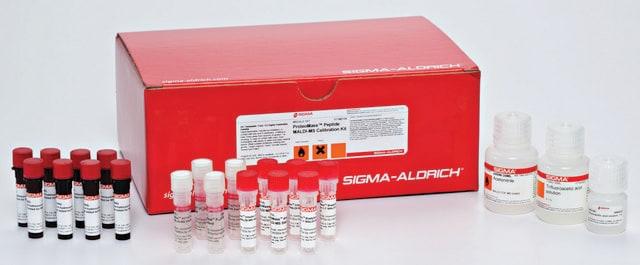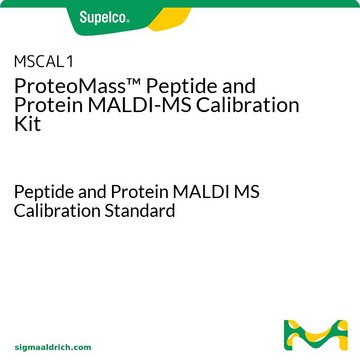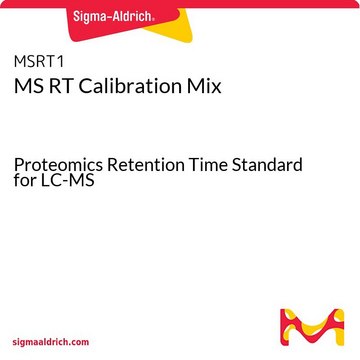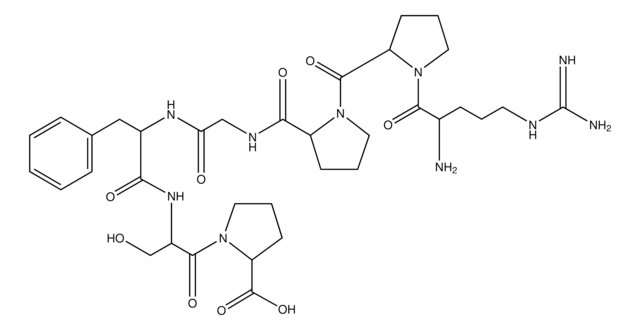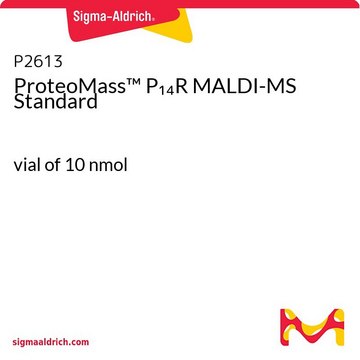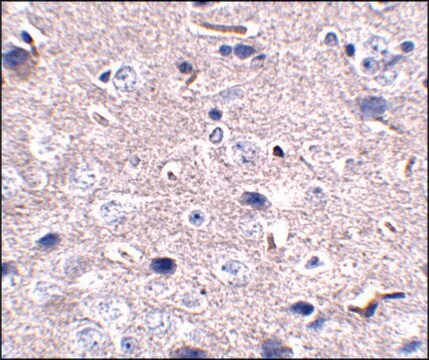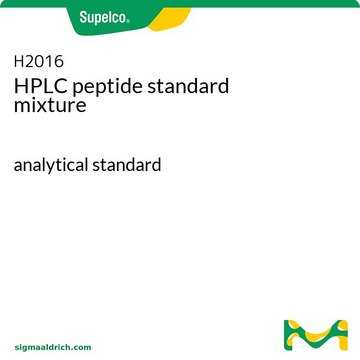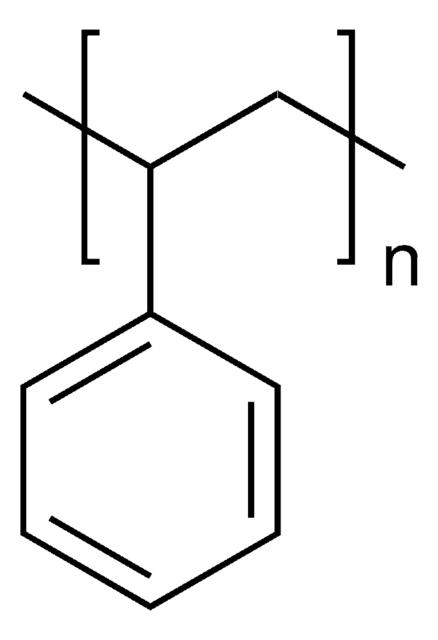MSCAL2
ProteoMass™ Peptide MALDI-MS Calibration Kit
Peptide MALDI MS Calibration Standard
Synonym(s):
Peptide Mass Spectrometry Calibrators
Sign Into View Organizational & Contract Pricing
All Photos(1)
About This Item
UNSPSC Code:
41116107
NACRES:
NA.24
Recommended Products
product line
ProteoMass™
Quality Level
quality
Peptide MALDI MS Calibration Standard
application(s)
cleaning products
cosmetics
flavors and fragrances
food and beverages
personal care
storage temp.
15-25°C
Application
This kit features a convenient selection of pre-qualified standard peptides, matrices, and solvents for calibrating and testing matrix assisted laser desorption ionization (MALDI) mass spectrometers. Configured specifically for peptide applications (in the mass range of 700 to 3500 Da), MSCAL2 is ideal for analysis of tryptic fragments or post-source decay studies. Applications also include calibration, tuning, and sensitivity testing of MALDI instruments from all manufacturers.
ProteoMass™ Peptide MALDI-MS Calibration Kit has been used as a mass calibration standard for MALDI-TOF MS (matrix assisted laser desorption ionization-time of flight mass spectrometry) analysis.
ProteoMass™ Peptide MALDI-MS Calibration Kit has been used as a mass calibration standard for MALDI-TOF MS (matrix assisted laser desorption ionization-time of flight mass spectrometry) analysis.
Legal Information
ProteoMass is a trademark of Sigma-Aldrich Co. LLC
Kit Components Also Available Separately
Product No.
Description
SDS
- B4181ProteoMass™ Bradykinin Fragment 1-7 MALDI-MS Standard, vial of 10 nmol, monoisotopic mol wt 756.3997 Da 2 x 10SDS
- A8846ProteoMass™ Angiotensin II MALDI-MS Standard, vial of 10 nmol 2 x 10SDS
- P2613ProteoMass™ P14R MALDI-MS Standard, vial of 10 nmol 2 x 10SDS
- A8346ProteoMass™ ACTH Fragment 18-39 MALDI-MS Standard, vial of 10 nmol, monoisotopic mol wt 2,464.1989 Da 2 x 10SDS
- I6154ProteoMass™ Insulin chain B oxidized MALDI-MS Standard, vial of 10 nmol 2 x 10SDS
- Acetonitrile 30 mL
- C8982α-Cyano-4-hydroxycinnamic acid, suitable for MALDI-TOF MS 8 x 10SDS
related product
Product No.
Description
Pricing
Signal Word
Danger
Hazard Statements
Precautionary Statements
Hazard Classifications
Acute Tox. 4 Dermal - Acute Tox. 4 Inhalation - Acute Tox. 4 Oral - Eye Irrit. 2 - Flam. Liq. 2 - Skin Irrit. 2 - Skin Sens. 1
Storage Class Code
3 - Flammable liquids
Flash Point(F)
35.6 °F
Flash Point(C)
2 °C
Choose from one of the most recent versions:
Already Own This Product?
Find documentation for the products that you have recently purchased in the Document Library.
Customers Also Viewed
Ultrasonic energy as a new tool for fast isotopic 18O labeling of proteins for mass spectrometry-based techniques: preliminary results.
Carreira RJ, et al.
Talanta, 76, 400-406 (2008)
Cindy Loui et al.
BMC microbiology, 9, 183-183 (2009-09-01)
The global regulatory system ArcAB controls the anaerobic growth of E. coli, however, its role in aerobic conditions is not well characterized. We have previously reported that ArcA was necessary for Salmonella to resist reactive oxygen species (ROS) in aerobic
Wei Huang et al.
Chembiochem : a European journal of chemical biology, 12(6), 932-941 (2011-03-05)
Structurally well defined, homogeneous glycopeptides and glycoproteins are indispensable tools for functional glycomics studies. By screening of various endo-β-N-acetylglucosaminidases through the use of appropriate synthetic donor and acceptor substrates, we have found that the Flavobacterium meningosepticum endo-β-N-acetyl-glucosaminidases (GH family 18)
Wei Huang et al.
Journal of the American Chemical Society, 131(6), 2214-2223 (2009-02-10)
Homogeneous N-glycoproteins carrying defined natural N-glycans are essential for detailed structural and functional studies. The transglycosylation activity of the endo-beta-N-acetylglucosaminidases from Arthrobacter protophormiae (Endo-A) and Mucor hiemalis (Endo-M) holds great potential for glycoprotein synthesis, but the wild-type enzymes are not
Yadong Wei et al.
Biochemistry, 47(39), 10294-10304 (2008-09-06)
The presence and precise structures of the glycans attached at the Fc domain of monoclonal antibodies play an important role in determining antibodies' effector functions such as antibody-dependent cell cytotoxicity (ADCC), complement activation, and anti-inflammatory activity. This paper describes a
Our team of scientists has experience in all areas of research including Life Science, Material Science, Chemical Synthesis, Chromatography, Analytical and many others.
Contact Technical Service